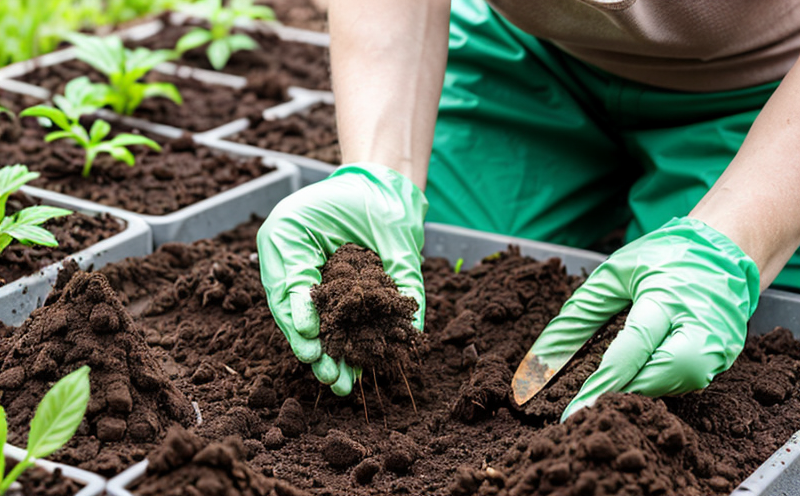JIS K 7215 Vicat Softening Point Testing of Gardening Plastics
The JIS K 7215 test method is a critical procedure in the evaluation of gardening plastics, particularly those used in outdoor applications. This testing process determines the Vicat softening point, which indicates the temperature at which a material starts to soften or deform under specified conditions. Understanding this property is essential for ensuring that materials perform reliably and safely across various environmental factors.
The JIS K 7215 standard specifies that the test should be conducted on a single sample of plastic material cut into a rectangular shape, measuring approximately 30 x 40 mm with a thickness of about 3 mm. This ensures uniformity in testing and comparability between samples. The specimen is placed horizontally in a cylindrical container filled with distilled water at a specific temperature, which is typically around 18°C.
The heating process starts from this initial temperature, and the temperature increases at a controlled rate of approximately 1°C per minute until the sample begins to deform under its own weight. The point at which deformation occurs is recorded as the Vicat softening point. This test provides valuable information for quality control and compliance with international standards.
For accurate results, it is crucial that the testing environment meets specific requirements. For instance, the temperature should be controlled within ±1°C to ensure precise measurement of the softening point. Additionally, the water used in the test must be distilled or deionized to prevent any contamination that could affect the outcome.
The JIS K 7215 Vicat softening point testing is widely recognized for its ability to assess the thermal stability of plastic materials used in outdoor applications such as gardening tools and equipment. By ensuring that these materials maintain their integrity under various environmental conditions, manufacturers can enhance product reliability and safety.
In summary, the JIS K 7215 Vicat softening point testing is a vital tool for quality assurance in the production of gardening plastics. It helps ensure that products meet stringent international standards and perform reliably across diverse environments.
Industry Applications
The JIS K 7215 Vicat softening point testing finds extensive applications in several industries, particularly those involving outdoor plastics used in gardening equipment. This includes manufacturers of plastic planters, garden tools, and other outdoor furniture.
- Plastic Planters: Ensuring that the plastic used for these containers has a suitable Vicat softening point is crucial to prevent damage from extreme weather conditions or accidental exposure to heat sources.
- Garden Tools: Testing the Vicat softening point of materials like polyethylene and polypropylene ensures that tools remain functional under varying temperatures, thereby enhancing user safety and product longevity.
- Outdoor Furniture: The durability and resistance of garden furniture to heat and environmental stress are significantly improved by adhering to JIS K 7215 standards during production.
The test is also beneficial for suppliers who need to ensure that the materials they provide meet the specific requirements set by end-users. By integrating this testing into their quality control processes, manufacturers can maintain a high level of product reliability and customer satisfaction.
Quality and Reliability Assurance
The JIS K 7215 Vicat softening point test is an integral part of the quality assurance process in many industries. It helps to ensure that materials used in gardening plastics meet stringent international standards, thereby enhancing product reliability and customer satisfaction.
One key aspect of this testing is its role in ensuring compliance with JIS K 7215 standards. This standard provides detailed procedures for conducting the Vicat softening point test, which include specific requirements for specimen preparation, temperature control during heating, and recording results accurately.
The test's accuracy can be further enhanced by using high-quality equipment such as a precisely calibrated Vicat apparatus and distilled water to ensure consistent results. Regular calibration of the apparatus is also essential to maintain its precision over time.
Another important factor in ensuring accurate results is the training of personnel conducting the tests. Well-trained technicians are better equipped to follow the standard procedures rigorously, which leads to more reliable data. Proper documentation of test parameters and results is equally crucial for traceability and audit purposes.
By incorporating JIS K 7215 Vicat softening point testing into their quality assurance processes, manufacturers can confidently produce products that meet international standards and perform reliably across various environmental conditions.
Use Cases and Application Examples
| Use Case | Description |
|---|---|
| Testing of Polyethylene Planters | Polyethylene planters are a common item in the gardening industry. The Vicat softening point test ensures that these planters can withstand extreme temperatures without deforming or breaking. |
| Evaluation of Polypropylene Garden Tools | For tools like rakes and shovels, ensuring a suitable Vicat softening point is crucial to prevent damage from exposure to heat sources or accidental overheating. |
| Quality Assurance for Outdoor Furniture | Outdoor furniture made of plastics needs to be durable and resistant to environmental stress. Testing the Vicat softening point helps ensure this quality. |
- Testing of Polyethylene Planters: This involves ensuring that the plastic used for planters can withstand extreme temperatures without deforming or breaking.
- Evaluation of Polypropylene Garden Tools: For tools like rakes and shovels, ensuring a suitable Vicat softening point is crucial to prevent damage from exposure to heat sources or accidental overheating.
- Quality Assurance for Outdoor Furniture: Testing the Vicat softening point helps ensure that outdoor furniture made of plastics remains durable and resistant to environmental stress.
These applications demonstrate how JIS K 7215 Vicat softening point testing plays a vital role in ensuring product reliability and safety across various environments. By adhering to these standards, manufacturers can produce high-quality products that meet international standards and perform reliably.





